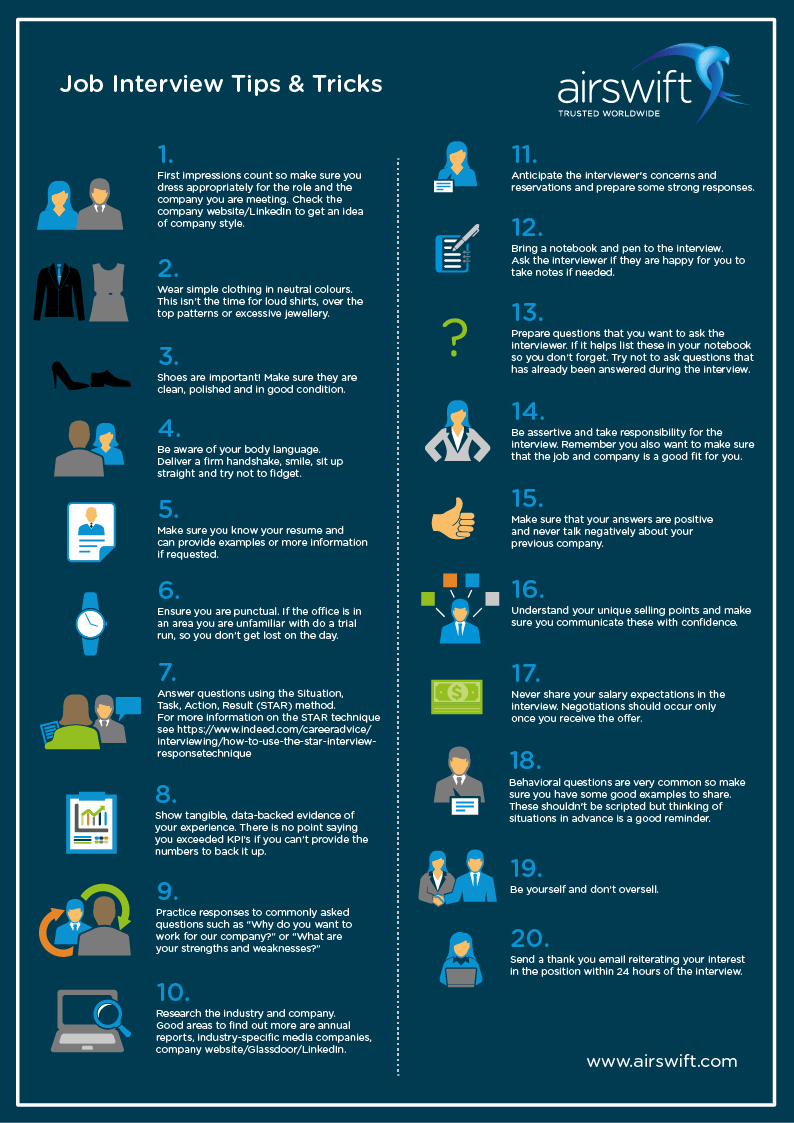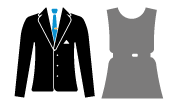
By
Leanna Seah
August 27, 2024
Updated
September 17, 2024
Remember these engineering interview tips to ace your next job interview
No matter your background or career level, job interviews are always a challenging and nerve-wracking part of the job application process.
Even if you’ve worked in the technical industries for decades, it’s well worth preparing yourself for every possible question and curveball your interview could throw at you.
To help, here is a list of 20 job interview tips and tricks.
Take a look and let us know if there are any others you would add!
- Dress professionally
- Avoid loud colours
- Wear clean shoes
- Be aware of your body language
- Be prepared to explain
- Be on time
- Use STAR method
- Show data-backed evidence
- Prepare for general questions
- Do your research
- Be ready to answer smartly
- Bring a notebook & pen
- Prepare questions to ask the interviewer
- Be assertive
- Be positive
- Identify your USP
- Never share your salary expectations
- Practice with examples
- Don't exaggerate
- Send a thank you email

If you’re currently looking for a job in the energy, process or infrastructure industries, we may be able to help. Click the link below to view our current vacancies.
 |
1. Dress professionally: First impressions count so make sure you dress appropriately for the role and the company you are meeting. If in doubt, dress one level above what people at the company wear on a day-to-day basis. Check the company website/LinkedIn to get an idea of company style. |
 |
2. Avoid loud colours: It is important to choose clothing in neutral colours. This isn’t the time for loud shirts, over the top patterns or excessive jewellery. |
 |
3. Wear clean shoes: Shoes are important! Make sure they are clean, polished and in good condition. |
 |
4. Be aware of your body language: Deliver a firm handshake, smile, sit up straight and try not to fidget. |
 |
5. Be prepared to explain: Make sure you know your resume and can provide examples or more information if requested. |
 |
6.Be on time: Ensure you are punctual. If the office is in an area you are unfamiliar with do a trial run, so you don’t get lost on the day. |
 |
7. Use the STAR method: Answer questions using the Situation, Task, Action, Result approach, also known as the STAR method. You’ll sound more credible while proving that you have the experience listed in your resume. |
 |
8. Show tangible, data-backed evidence of your experience: There is no point saying you exceeded KPI’s if you can’t provide the numbers to back it up. |
 |
9. Prepare for general questions: Practice responses to commonly asked questions such as “Why do you want to work for our company?”, “Tell me about yourself?” or “What are your strengths and weaknesses?” |
 |
10. Do your research: Ensure to find more about the industry and company. Good areas to find out more are annual reports, industry-specific media companies, company website/Glassdoor/LinkedIn. |
 |
11. Be ready to answer smartly: Anticipate the interviewer’s concerns and reservations and prepare some strong responses. |
 |
12. Bring a notebook & pen: Ask the interviewer if they are happy for you to take notes if needed. |
 |
13. Prepare questions to ask the interviewer: If it helps list these in your notebook so you don’t forget. Try not to ask questions that has already been answered during the interview. |
 |
14. Be assertive: Take responsibility for the interview. Remember you also want to make sure that the job and company is a good fit for you. |
 |
15. Be positive: Make sure that your answers are positive and never talk negatively about your previous company. |
 |
16. Identify your USP: Understand your unique selling points and make sure you communicate these with confidence |
 |
17. Never share your salary expectations: If there is a situation where they ask about the salary, respond with something like “My salary expectations are in line with my experience and I’m confident that you’re offering a salary that’s competitive in the current market”. Negotiations should occur only once you receive the offer. |
 |
18. Practice with examples: Behavioral questions are very common so make sure you have some good examples to share. These shouldn’t be scripted but thinking of situations in advance is a good reminder |
 |
19. Don't exaggerate: Be yourself and don’t oversell. |
 |
20. Send a thank you email: It would be good to drop a thank you email reiterating your interest in the position within 24 hours of the interview. |
Success in today’s candidate-driven engineering job market through interview skills
In today’s candidate-driven job market, engineering skills are highly valued across various disciplines such as electrical, mechanical, quality, robotics/automation, civil, and manufacturing engineering.
Following the general principles outlined in the engineering interview tips above will enhance candidates' interview skills, significantly boosting their chances of securing employment.
Maximise your interview opportunities: Resume formats and templates
To secure interview opportunities, it’s vital that your resume effectively showcases your strengths. Popular engineering resume formats, including Chronological, Functional, and Project-Based, should be chosen based on your career experience and its alignment with the desired position.
If you’re currently looking for a job in the energy, process or infrastructure industries, we may be able to help. Click the link below to view our current vacancies.

